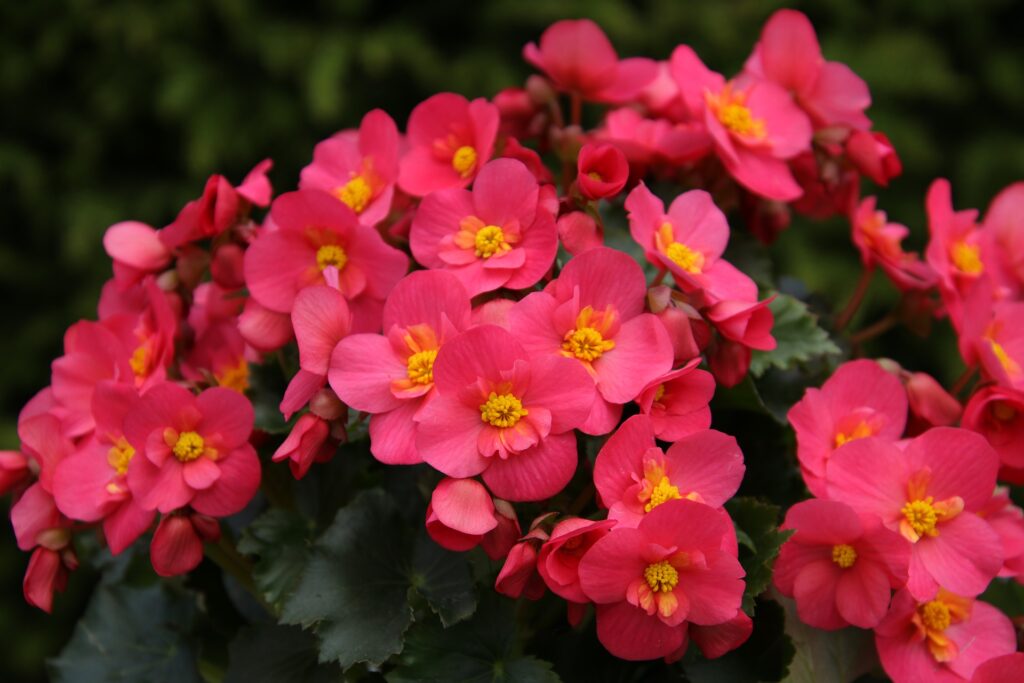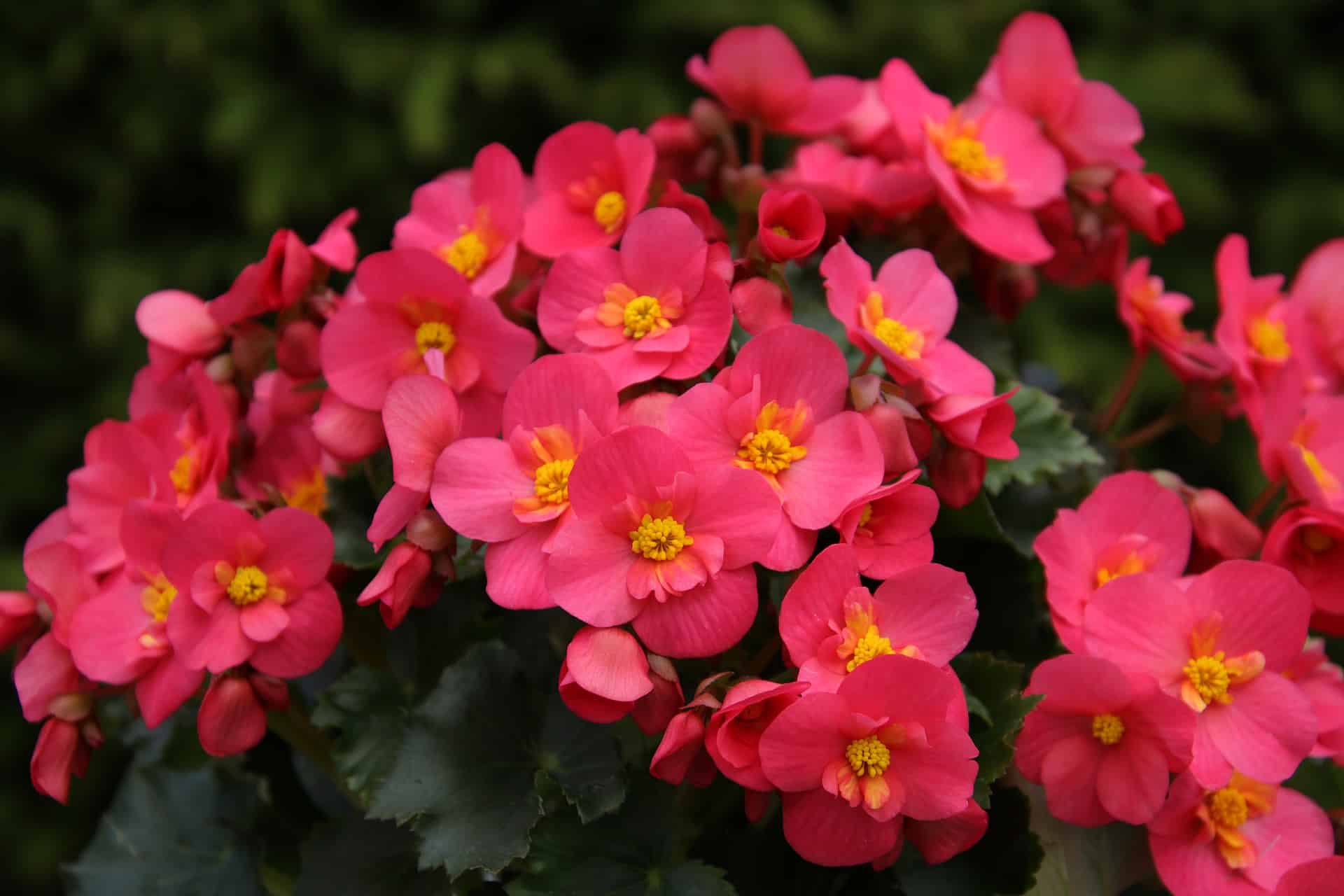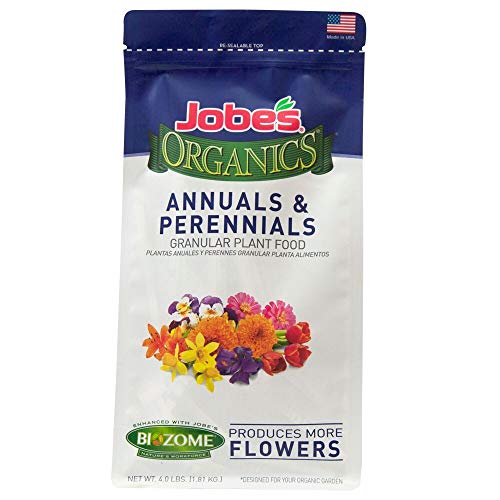Begonias need the right fertilizer in order to thrive when grown in a container or out in your garden. The best fertilizer for begonias is one that promotes root growth and gives them a boost of phosphorus for healthy flower development.
On this page, you’ll find some of the best fertilizers for begonias so you can grow your begonias to their full potential.
Best Fertilizer for Begonias
Best Fertilizer for Begonias
Espoma FT18 Flower Tone, 18-Pound
Flower Tone (Buy Online) is an organic fertilizer that helps keep begonias healthy and vibrant all season long by supporting their root systems while encouraging flower development rather than foliage growth. Plus, this low-nitrogen formula is delicate on slow-growing plants, and it won’t burn your begonias root system.
Flower Tone also contains a mix of beneficial microbes that help improve nutrient absorption and drought tolerance.
If you’ve struggled with keeping begonias alive in the past, consider using Flower Tone as part of your regular fertilization routine this year.
By adding some every few weeks during peak growing season (spring through fall), we guarantee that your begonias will thrive like never before.
EarthPods Premium Bloom Flowering Plant Food – Easy Organic Fertilizer Spikes
EarthPods Premium Bloom Flowering Plant Food (Buy Online) is one of the best fertilizers for begonias grown in containers. It’s made from 100% organic ingredients and contains humates which help plants absorb nutrients more effectively. It also contains trace minerals that give your plant extra energy to produce big blooms and lush growth.
EarthPods Premium Bloom Flowering Plant Food will boost your plant’s ability to produce flowers and root growth by providing them with all the essential nutrients needed to thrive.
On top of all that, this fertilizer will boost the color of your flowers so you can enjoy an explosion of beautiful blossoms all summer long.
Plus, this easy-to-use fertilizer is completely safe for pets and children, so you don’t have to worry about your loved ones being harmed by exposure to this all-natural eco-friendly fertilizer.
Bayer Advanced All in One Rose and Flower Care Granules
Bayer Advanced All-in-One Flower Care Granules (Buy Online) help all types of flowers grow stronger roots and more vibrant blooms by providing balanced nutrition from root to tip. It even fights fungal diseases so you’ll spend less time treating your plants for pests or disease
Bayer’s advanced formula kills disease-causing insects on contact while delivering the nutrients your flowers need to stay healthy all season long. It even protects against fungal infections like rust, powdery mildew, black spot, and more.
Schultz Spf48410 Rose & Flower Slow-Release Plant Food
Schultz Rose & Flower Slow-Release Plant Food (Buy Online) feeds plants over 3 months, which means you don’t have to worry about feeding them again for a long time.
Shultz Slow-Release Plant Food also contains micronutrients that are essential for optimal flower growth and development – so you can enjoy healthier blooms with every watering.
Plus it’s easy to use – no mixing required. Just sprinkle it on top of the soil or directly into your potting mix before planting. And best of all, this plant food has been specially formulated specifically with flowering plants in mind – so they will get everything they need from one source.
Scotts Super Bloom Water Soluble Plant Food
Scotts Super Bloom (Buy Online) has the right combination of nutrients to promote healthy plant growth and flowering without burning your begonias roots. This water-soluble plant food also contains high levels of phosphorus which plays a role in establishing a strong root system, and it also helps promote flower development.
Dr. Earth Organic Bud & Bloom Fertilizer
Dr. Earth Organic Bud & Bloom Fertilizer (Buy Online) makes it easy to grow beautiful begonias. This organic plant food contains seven strains of beneficial soil microbes plus Ecto and endo mycorrhizae, a pro-biotic blend of bacteria that can improve root health. It’s made with 100% organic and natural ingredients such as fishbone meal, alfalfa meal, feather meal, soft rock phosphate and mined potassium sulfate, and more. And best of all it feeds for several months so it lasts longer than other organic fertilizers on the market.
J R Peters Inc 51024 Jacks Classic No.1.5 10-30-20 Blossom Booster Fertilizer
Jacks Classic Blossom Booster (Buy Online) is a professional formula designed to produce more flowers and brighter colors on all indoor and outdoor plants.
Most fertilizers are not balanced for flowering plants, which can lead to weak growth, poor coloration, or even burned leaves.
Jacks Classic Blossom Booster 10-30-20 fertilizer solves this since it contains the right balance of nutrients (nitrogen, phosphorus, and potassium) along with added magnesium that will ensure your begonia plants develop lush deep green foliage.
Down to Earth Organic Rose & Flower Fertilizer Mix 4-8-4, 5 lb
Down To Earth Rose & Flower Mix (Buy Online) is a five-pound box of all-natural fertilizer with a 4-8-4 NPK formula. This special fertilizer blend provides ample nitrogen for vigorous growth, extra phosphorus for beautiful blooms, and potassium and trace elements that will promote blooms all season long.
Jobe’s Hanging Baskets and Potted Plants Fertilizer Spikes
With Jobe’s Hanging Basket Fertilizer Spikes (Buy Online) it is now easier than ever for anyone to take care of their begonias without having the fuss of messy runoff or over-watering. These pre-measured spikes ensure that your begonia gets just enough nutrients every time so that they will stay healthy for up to 2 months!
Jobe’s Organics Organic Fertilizer, 4 lb
Jobe’s Organics (Buy Online) is an all-natural fertilizer made from organic ingredients that are 100% safe to use around kids and pets. It contains no synthetic chemicals or toxic pesticides, so there’s nothing to worry about when using it in your garden or lawn.
This special formula includes a microbe package called Biome with archaea which breaks down nutrients in the soil faster than other fertilizers, resulting in healthier plants. Plus, because of its unique properties, this special microbe blend improves soil quality over time as well – meaning less work on your part and better results overall.
Best Liquid Fertilizer for Begonias
Miracle-Gro LiquaFeed Bloom Booster Flower Food
Miracle-Gro LiquaFeed Bloom Booster (Buy Online) is a liquid fertilizer that you can use on your flowering plants. Feeding your flowering plants with Miracle-Gro LiquaFeed Bloom Booster Flower Food is as easy as watering them with plain tap water.
Just add it into any 1 gallon or larger feeder and then apply it to the soil of your flower beds every 1–2 weeks during their active growth cycle for best results. Each bottle feeds up to 400 square feet of garden space so one bottle will last for months when used bi-weekly.
Triple 10 All Purpose Liquid Fertilizer 10-10-10 with Amino Acids
Triple 10 All Purpose Liquid Fertilizer (Buy Online) is a highly concentrated, low-cost generic brand of liquid fertilizer that’s perfect for all your gardening needs. Plus, it contains 5.5% amino acids and seaweed extract to help plants grow healthy roots while providing them with necessary nutrients throughout their life cycle.
Begonia Fertilizer Requirements

Begonia plants are beautiful, but they can be difficult to care for. However, you can increase your begonias’ chances of producing flowers by fertilizing them with a high-phosphorus fertilizer in June.
Use a general-purpose 10-10-10 fertilizer early in the season and then switch to a high phosphorus fertilizer as soon as you notice flower buds becoming visible on your begonia plants.
RELATED: How To Grow Begonias
How To Fertilize Begonias
The first step to fertilizing your begonias is to choose the best fertilizer for begonias, which you can find if you scroll up.
Then once you have your fertilizer in hand you can follow these simple steps if you want to know how to fertilize your begonia plants
Step 1
Begonias are delicate flowers that need tender loving care. To keep them healthy and colorful you should fertilize the soil around their roots every 2 to 4 weeks, but if it’s too much work or time-consuming then consider using a fertilizer labeled as “time-release” that can last up to 3 months.
Step 2
After fertilizing your begonias, you’ll want to water them thoroughly. You can do this by watering the soil after applying the fertilizer so that it will have enough moisture to get access to nutrients for growth.
Diluting the fertilizer with plenty of water also helps reduce the risk of burning your begonia plant’s roots.
Step 3
During the warmer months, it’s important that you give your begonia supplemental fertilizer from time to time if it’s looking pale or if its leaves start turning yellow because this indicates a deficiency that can lead to wilting as well as leaf curling due to lack of nutrients.
If this happens you should use a liquid fertilizer to quickly rectify the problem, but dilute it down to 1/3 strength before applying it during your regular watering routine
Begonia Problems
Why Are My Begonias Turning Yellow
Lack of Nitrogen: Begonias require all the standard nutrients, such as nitrogen. If a plant does not receive enough nitrogen in the soil, for instance, it will often turn yellow.
Iron Deficiency: Iron deficiency is another issue that leads to begonias turning yellow, but the veins of their leave will still remain green
To combat this problem apply an iron sulfate powder, or you can use a chelated iron fertilizer that has better stability in higher pH soil.
Why Are My Begonias Turning Brown
The top reasons why your begonias might be turning brown are 1) moisture (either not enough, or too much), 2) low humidity levels, 3) excess sunlight cooking the leaf tissues and 4) fungal disease.
Why is My Begonia Losing Leaves
Your begonia could be losing leaves if you overwater your plants too often. Root rot is the most common outcome of over-watering and it can cause wilting and loss of leaves.
An insect infestation could also result in leaf wilting and dropping – look for pests like mites, spider mites, and aphids which may reside on the underside of the leaves where they feed on plant sap.
Why Are My Begonias Not Blooming
The most likely cause of your begonias not blooming is that they’re not getting enough phosphorus. As a plant nutrient, phosphorus is vital for flower development, and it also helps promote a healthy root system.
Why is My Begonia Leggy
If your begonia isn’t getting enough light, it will grow tall and leggy instead of compact and bushy. Low levels of plant light lead to slower growth which in turn can lead to your begonia looking leggy with long stems that don’t hold up well.
Why is My Begonia Limp
It’s possible that your Begonia is limp due to a lack of water or too much direct sunlight. Another reason that your begonias might be limp is that the plant has been invaded by insects, or it could have been damaged in some other way.

















